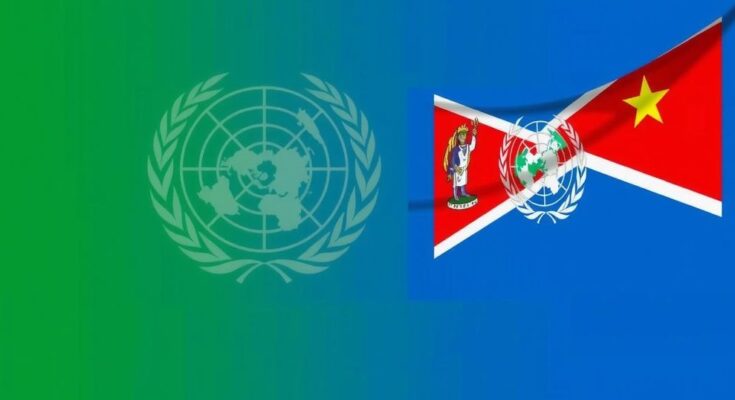Papua New Guinea has decided to boycott the forthcoming UN climate summit, criticizing it as a “waste of time” due to empty commitments from major polluters. Foreign Minister Justin Tkatchenko expressed frustration with the lack of progress in climate negotiations, advocating instead for bilateral agreements with countries like Singapore to attain more effective climate solutions.
Papua New Guinea has announced its decision to boycott the upcoming United Nations climate summit scheduled for next month, characterizing the global warming discussions as an exercise in futility filled with empty commitments from major polluting nations. The country’s Foreign Minister, Justin Tkatchenko, articulated the government’s frustration, suggesting that participation is counterproductive, especially when it results in fatigue without tangible outcomes. This announcement marks a significant departure from the typical diplomatic stance towards such global climate forums. Mr. Tkatchenko stated, “There is no point going if we are falling asleep because of jet lag because we are not getting anything done,” underscoring a growing impatience with perceived inaction at the COP meetings. He elaborated that large emitting countries often announce substantial financial pledges for climate relief, yet the actual assistance often ends up benefiting consultants rather than yielding real solutions. The environmental significance of Papua New Guinea is underscored by its status as home to one of the world’s largest rainforests, often referred to as one of the planet’s “lungs.” Despite its ecological treasures, the nation faces severe vulnerabilities due to climate change, with Foreign Minister Tkatchenko expressing dissatisfaction with the COP process, indicating that it has become a repetitive cycle lacking significant progress. Mr. Tkatchenko remarked, “COP is a total waste of time. We are sick of the rhetoric as well as the merry-go-round of getting absolutely nothing done over the last three years.” He stated the need for more concrete action rather than mere dialogue at these conferences. The sentiment reflects a broader critique where many developing nations feel neglected amidst the influences of larger polluters at such negotiations. Papua New Guinea is not alone in its criticism; previous COP renditions have faced skepticism for perceived failures to hold major polluters accountable, as evidenced during various past summits. The foreign minister suggested that instead of participating in what he described as a “talk fest,” Papua New Guinea would seek meaningful climate agreements through bilateral negotiations with sympathetic nations such as Singapore, proposing that these engagements could yield significantly better results. In conclusion, Papua New Guinea’s withdrawal from the COP29 summit signals a significant shift in how some nations perceive the efficacy of international climate dialogues. It highlights a demand for accountability and tangible action that aligns with the urgent need for climate solutions, particularly from those nations bearing the brunt of climate impacts. As a response to the ongoing climate crisis, smaller nations are advocating for a more vigorous acknowledgment and action that resonate beyond mere promises made in grand summits.
The context surrounding Papua New Guinea’s boycott of the UN climate summit is rooted in a widespread dissatisfaction with the effectiveness of international climate negotiations. The COP summits, intended as platforms for global leaders to negotiate binding commitments to reduce greenhouse gas emissions and combat climate change, have increasingly faced criticism for failing to produce substantive progress. This dissatisfaction is particularly pronounced among developing nations, which often feel sidelined in discussions dominated by more affluent, heavily polluting countries. The urgency of these discussions is further amplified by the real-world impacts of climate change being directly felt by nations like Papua New Guinea, which are particularly vulnerable due to their geographic and socio-economic conditions.
In summary, Papua New Guinea’s decision to boycott the upcoming COP29 climate summit reflects deep-seated frustrations regarding the effectiveness of international climate negotiations. By choosing to pursue bilateral agreements instead, the country aims to secure meaningful climate action that aligns with its environmental aspirations and the urgency of the climate crisis. This decision may inspire other nations to reconsider their engagement with COP discussions, urging a more productive dialogue centered on accountability and real progress against climate change.
Original Source: www.voanews.com




